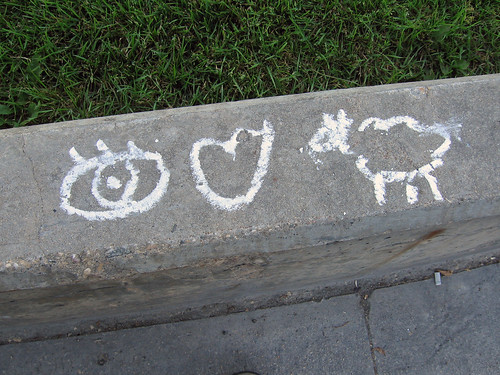 This morning it’s nice and cool out — I woke up to the commingled sounds of birds waking and foghorns warning. Nice to be in that space between alarm and exuberance.
This morning it’s nice and cool out — I woke up to the commingled sounds of birds waking and foghorns warning. Nice to be in that space between alarm and exuberance.
~~ ~~ ~~ ~~ ~~ ~~
We’ve got a full house for this weekend’s Writing the Flood — that means more opportunities for folks to connect with one another and build writing community. Plus I’ve got all these new workshop ideas after spending a weekend with AWA facilitators. I’m looking forward to Saturday!
~~ ~~ ~~ ~~ ~~ ~~
I believe I have mentioned (can’t stop mentioning) that I’m preparing for to take the GRE on August 1. So I’m re-learning old arithmetic, algebra, geometry formulas (dividing by a fraction or quadratic equation, anyone? triangle inequality theorem? isosceles triangles? the volume of an irregular quadrilateral?), practicing vocabulary (I’ve recently learned mulct and mountebank) and reminding myself how to write the five-paragraph essay (about which in particular I have a great deal of anxiety — more on that in a minute). I’m doing practice tests and reading practice/prep material, all of which reminds me that the GRE is not a math test, not a vocab or spelling quiz — this is a critical thinking and reasoning assessment. So, in addition to all the rest, I am dusting off my inner skeptic.
I tend to think of myself as relatively un-skeptical — at least,about most topics. Of course, when someone in a position of authority over those with little or no power speaks, my skeptic wakes up. When the president opens hir mouth, my skeptic pays attention. When the mainstream media asserts most anything, I question their declarations. Hm — I even talk back to commercials, refuting their blithe and cheery diatribe whenever possible. So what gave me the idea that I wasn’t skeptical, that I couldn’t find logical flaws in arguments, that I’m not able to think critically?
Here’s what — when someone wants to have a ‘reasonable, measured’ conversation about something I care passionately about, I freeze. Do any of you have this response? Say someone wants to talk calmly (that is, unemotionally) about child sexual abuse in the country. I have to turn off half my brain, half my heart, to talk in an unemotional way about something I have such strong feelings about. And what happens when I enter into the conversation is that I 1) get triggered and shut down and 2) feel a trainwreck of thoughts and ideas piling up inside my throat, unable to all emerge at one time. When did I get the idea that it wasn’t ok to be both emotional and logically reasoned? Well, from Western cultural indoctrination, of course, that pits emotion and logic against each other — and that has equated emotion with womanness and logic with maleness. To be emotional is to be a woman, to make a weaker argument, to be always attenuated. I felt it was inherently impossible for me to engage in these conversations successfully, so I avoided them. This meant, in some cases, that I avoided some important critical thinking about, critical engagement with, issues that are important to me.
I had a great conversation with my friend Chris deLorenzo last week — he’s an AWA workshop facilitator (check out Laguna Writers) who also has taught composition classes to college freshmen. He reminded me of the need to interweave logos and pathos (and ethos) into a good essay — we need both the logical/rational reasoning and the heart-engagement (and we want to create a credible, trustworthy voice in the writing). A piece of writing that’s all logos, all logical reasoning, feels like it has no center, no heart, and is hard to connect with. Writing that’s all pathos ends up feeling sentimental and mushy, like it has no core to hold it up. When we bring them together, however, we provide an emotional connection with information or a new way of thinking, and this brings readers into the work.
So I’m practicing remembering a couple of things: first, that I know how to do this, and second, that I can slow down and still have room, time and space, to present my argument. There’s no stepfather here to interrupt and move the goalposts halfway through the writing, changing the terms of the discussion so that it’s impossible for me to engage consistently. I remind myself that heart and passion in writing, even in essay and nonfiction, isn’t just a good thing — it’s necessary. And I remind myself that I have the capacity to think and engage both open-heartedly and critically. We each do.
~~ ~~ ~~ ~~ ~~ ~~ ~~ ~~
Is there a topic that you find it hard to write or talk about because there’s so much you want to say and it gets jumbled inside your mouth or about which your mind goes blank when you’re asked to speak ‘rationally’ about it? Want to take a few minutes today for that topic? Maybe it’s the rights of animals or child trafficking or rape laws or gun ownership or environmental protection or… just notice what comes up for you. Give that subject 10 minutes today — take a few deep breaths, and write down what you believe. Then write down why.
Thanks for your heart-centeredness, your passionate reason, your thoughtful, though-out exhuberance, your creative acts, your compassionate logic — thank you for your patience with others, and thank you for your words.

One response to “passionate reason”